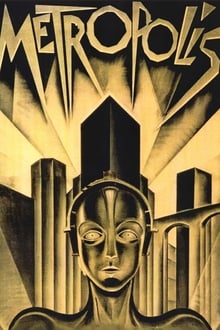
This has got to be the ultimate cinematic illustration of the strata of human existence. Whether it be a story of the survival of the fittest; the cleverest; the most devious; most beautiful - or a hybrid of some/all - it reflects poignantly how humanity always seeks to exist within a hierarchical structure (merited or otherwise, but perfectly epitomised here by the matriarchal, deific robot), but how much more effectively mankind can succeed if it accepts and values everyone and works together. It also clearly identifies the perennial problem of those with the brain always ending up far more successful, comfortable - and powerful than those who do the labour. Hence, this wonderful tale from Fritz Lang takes us to "Metropolis" - a totalitarian - though not necessarily intentionally malevolent - society, in which everyone has their place and role. Except, that is - for the son of the "Master". Like many a fickle youth; he has little to occupy his time and his meaningless existence leaves him ripe for new ideas. When he takes pity on a recently sacked employee of his father and shortly afterwards is exposed to a lifestyle he couldn't even have imagined, the story starts to gain a thought-provoking and unstoppable pace. The score magnificently guides us from the drudgery of day-to-day-life through the emancipating revolution that inevitably follows, with all of the ill-foreseen, largely devastating consequences - like a bottle of champagne that has been shaken, sooner or later the cork pops! It is also a story of love between the son and a woman way, way, way beneath his station. Yes, there is light on the sunlit uplands - and much like a forest fire that destroys all in it's path; this film clearly suggests at the end that hope and optimism will triumph and a green shoots of recovery starts to grow again... It also, as a piece of cinema, is clearly the inspiration for so many directors, cinematographers and story tellers that followed...